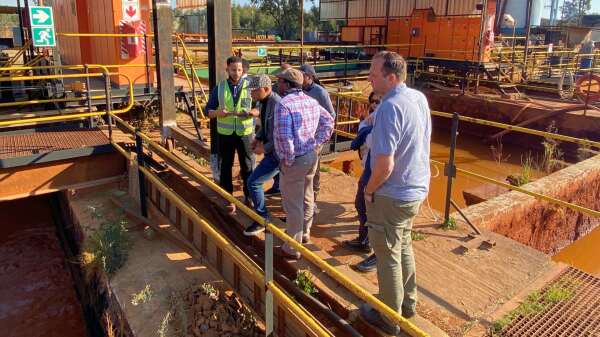ZWU News

Mine water in South Africa Sustainably treated
25.06.2024
Coal was mined in the Ruhr area for over 150 years - with far-reaching consequences for water management in the region. In South Africa, one of the largest mining countries in the world, water engineers and water experts from the Centre for Water and Environmental Research at the University of Duisburg-Essen are now providing support with solutions for sustainable water management. The joint project MAMDIWAS* is funded by the Federal Ministry of Education and Research with 1.3 million euros.
Mining in South Africa has a significant impact on water quality and availability. Mining pollutes the groundwater and surface waters with heavy metals, acids and other toxic substances, the groundwater table sinks and the local water supply is impaired. In the long term, this causes considerable ecological damage to aquatic ecosystems.
"Together with local partners from research and industry, we want to tackle the ecological and financial challenges posed by untreated water affected by mining (MIW)," explains Prof Dr Stefan Panglisch. "We want to demonstrate how this water can be treated so that it can be reused as drinking water or for irrigation, for example." At the same time, the potential for recycling raw materials found in mine water is being researched, which promises additional economic and ecological benefits.
The project also focuses on promoting competitiveness through the reuse of water and materials. "This measure is intended not only to stimulate technological innovation, but also to promote entrepreneurship and the active participation of local communities and support sustainable development in the region," emphasises Panglisch.
The project also aims to sustainably improve the ecological status of rivers that are polluted by mine water. To this end, a regional concept for integrated water resource management is being developed that is specifically tailored to the needs of the affected areas.
"Our aim is to drive forward the transformation from a mining-based society to a sustainable post-mining region. In this context, the Ruhr region is a prime example of how structural change can be successfully achieved through targeted economic diversification measures and comprehensive environmental measures. This experience offers valuable insights for South Africa, where similar challenges exist," says Panglisch.
*The joint project MAMDIWAS (Making mining-influenced water a driver for change to improve water security in South Africa) is being funded by the Federal Ministry of Education and Research with €1.3 million. The UDE is receiving €725,000. The German partners in the joint project include the IWW Centre for Water, the Wuppertal Institute and SiMA-tec GmbH. On the South African side, Stellenbosch University and the University of South Africa are involved. In addition, the network is working with 13 associated partners such as Ruhrkohle AG and the South African energy company Eskom.


